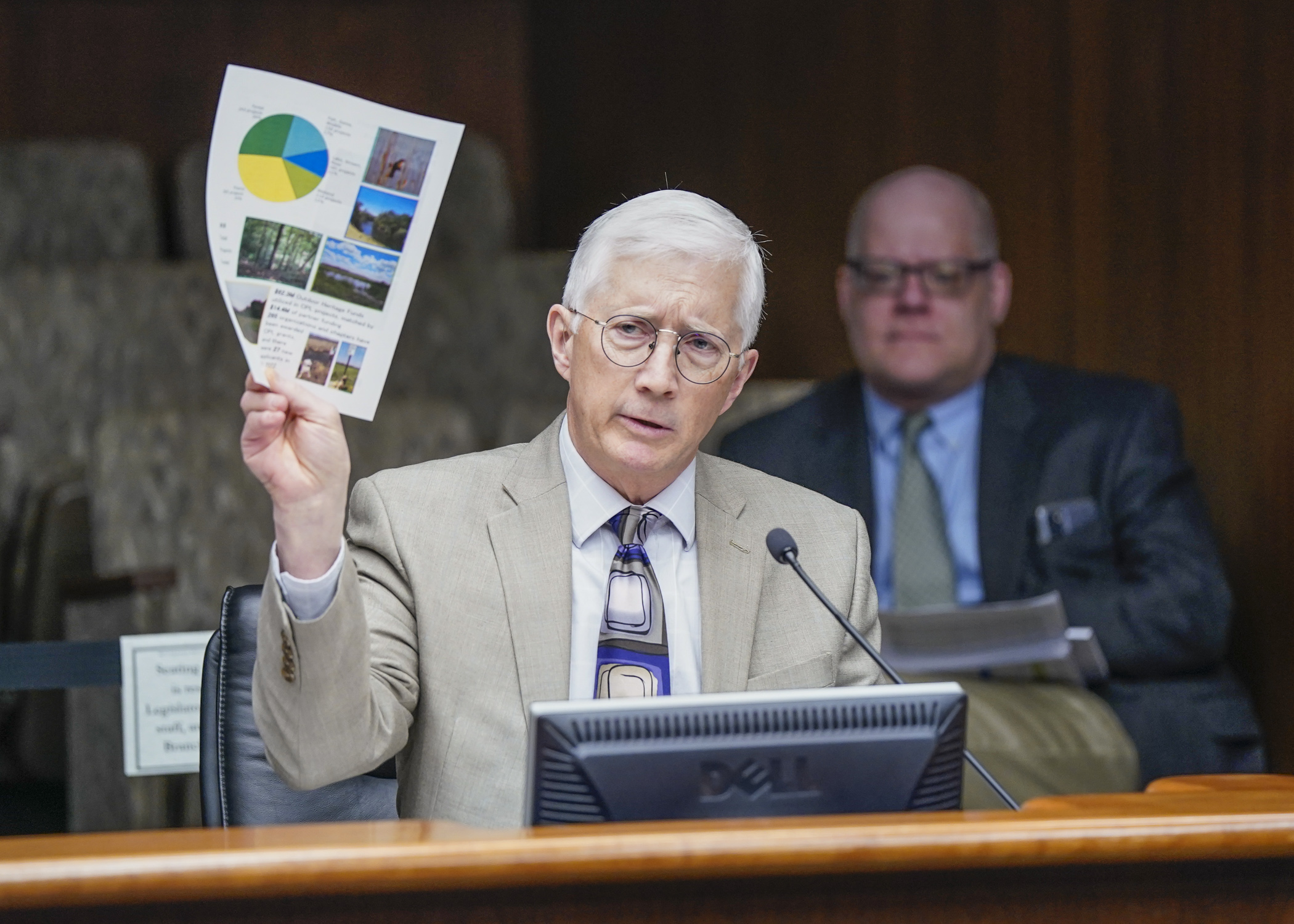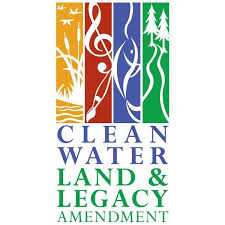$820 million omnibus legacy bill sparks controversy, clears committee by narrow margin

Water. Land. Legacy.
HF1999 covers it all.
It would clean up Minnesota waters, preserve habitat, invest in the state’s arts and cultural heritage, and improve parks and trails, said Rep. Leon Lillie (DFL-North St. Paul).
He sponsors the bill that would appropriate $820.8 million during the 2024-25 biennium from funds established through the Clean Water, Land and Legacy Amendment.
After adopting a delete-all amendment, the House Legacy Finance Committee approved the omnibus legacy finance bill 6-5 Wednesday. Rep. Samakab Hussein (DFL-St. Paul) joined Republicans in voting against the bill, now on its way to the House Ways and Means Committee.
[MORE: View the spreadsheet]
Since July 1, 2009, a constitutional amendment has raised the state sales tax by 0.375% and dedicated that additional revenue to four funds: 33% for the Clean Water Fund; 33% for the Outdoor Heritage Fund: 19.75% for the Arts and Cultural Heritage Fund; and 14.25% for the Parks and Trails Fund.
Clean Water Fund
Most of the bill’s funding would go to the Clean Water Fund. The $317.4 million appropriation includes:
- $156.13 million for grants to implement state-approved watershed-based plans;
- $48.38 million for statewide assessments of surface water quality and trends;
- $41.68 million to increase monitoring for pesticides in surface water and groundwater;
- $25.56 million for various projects involving monitoring, preservations, and restoration;
- $23.2 million for several endeavors involving water contaminants and public health;
- $16.7 million for small community wastewater treatment grants;
- $3.75 million for the Metropolitan Council to fulfill projects addressing threats to drinking water supply; and
- $3 million to the University of Minnesota to develop county geologic atlases and evaluate the best stormwater management practices.
Outdoor Heritage Fund
The Lessard-Sams Outdoor Heritage Council recommends funding 48 programs to restore, enhance or protect an estimated 121,383 acres of wildlife habitats and 39.75 miles of shoreline, said executive director Mark Johnson.
The $171.79 million appropriation in fiscal year 2024 for the Outdoor Heritage Fund, includes:
- $97.35 million for habitats;
- $33.47 million for wetlands;
- $31.92 million for prairies;
- $6.57 million for forests; and
- $2.49 million for administration.
Parks and Trails Fund
The Parks and Trails Fund has a $136.61 million appropriation and would give $82.51 million of it to the Department of Natural Resources to connect people to the outdoors, acquire land and create opportunities.
For projects and grants supporting parks and trails, the other main appropriation in that fund would send around $54.1 million to the Metropolitan Council.
Arts and Cultural Heritage Fund
The State Arts Board would receive $96.67 million from the Arts and Cultural Heritage Fund with the remainder of the $195.05 million divvied up as:
- $37.5 million to the Minnesota Historical Society to provide statewide historic or cultural grants and fund different programs related to state heritage;
- $24.75 million to the Department of Administration;
- $5.75 million to the Department of Education;
- $4.6 million to the Indian Affairs Council to preserve Dakota and Ojibwe languages; and
- $800,000 to the Department of Agriculture.
Part of the allocation to the Minnesota State Arts Board would be spent on arts access initiatives, such as free-access days for Minnesota residents to art institutions.
Additional organizations that could expect funding include Minnesota Public Radio, AMPERS Radio, Wilderness Inquiry, Como Park Zoo, Great Lakes Aquarium and Appetite for Change.
Despite requesting direct appropriations, many children’s museums would have to receive funds through a competitive grant process.

Not wanting to “rubber stamp,” Rep. Kaohly Vang Her (DFL-St. Paul) finds competitive grants create a fairer system because legislators can’t know all the people and groups that should be funded, but the vetted organizations awarded the grants are bettered equipped to do so.
Member discussion
Legislators on both sides of the aisle felt frustration with a lack of direct appropriations for many organizations.
Rep. Josh Heintzeman (R-Nisswa) doesn’t believe the structure of committee spending needs to change and wanted a better understanding of who is on the other side of these appropriations.
As a sponsor of bills that didn’t make it into the omnibus proposal, such as HF1676 for Somali arts programs, Hussein is disappointed to not see equity or funding for the people who need it. “I want my kids to learn my culture the same way that I’m learning [about] other cultures in our state.”
***
What’s in the bill?
The following are bills that have been incorporated in part or in whole into the omnibus legacy finance bill:
- HF68 (Jordan)
- HF224 (Urdahl)
- HF225 (Urdahl)
- HF470 (Bierman)
- HF676 (Lillie)
- HF775 (Brand)
- HF857 (Olson, L.)
- HF901 (Urdahl)
- HF1146 (Newton)
- HF1154 (Hussein)
- HF1192 (Vang)
- HF1247 (Pérez-Vega)
- HF1263 (Hussein)
- HF1281 (Jordan)
- HF1408 (Frazier)
- HF1657 (Olson, L.)
- HF1965 (Finke)
- HF2074 (Lillie)
- HF2075 (Lillie)
- HF2088 (Her)
- HF2108 (Hansen)
- HF2120 (Jordan)
- HF2386 (Cha)
- HF2566 (Huot)
- HF2829 (Lillie)
- HF2957 (Frazier)
- HF3059 (Cha)
Related Articles
Search Session Daily
Advanced Search OptionsPriority Dailies
Speaker Emerita Melissa Hortman, husband killed in attack
By HPIS Staff House Speaker Emerita Melissa Hortman (DFL-Brooklyn Park) and her husband, Mark, were fatally shot in their home early Saturday morning.
Gov. Tim Walz announced the news dur...
House Speaker Emerita Melissa Hortman (DFL-Brooklyn Park) and her husband, Mark, were fatally shot in their home early Saturday morning.
Gov. Tim Walz announced the news dur...
Lawmakers deliver budget bills to governor's desk in one-day special session
By Mike Cook About that talk of needing all 21 hours left in a legislative day to complete a special session?
House members were more than up to the challenge Monday. Beginning at 10 a.m...
About that talk of needing all 21 hours left in a legislative day to complete a special session?
House members were more than up to the challenge Monday. Beginning at 10 a.m...